Microtome cuts - Study guides, Class notes & Summaries
Looking for the best study guides, study notes and summaries about Microtome cuts? On this page you'll find 13 study documents about Microtome cuts.
All 13 results
Sort by
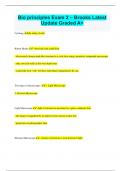
-
Bio principles Exam 2 – Brooks Latest Update Graded A+
- Exam (elaborations) • 63 pages • 2024
- Available in package deal
-
- $11.99
- + learn more
Bio principles Exam 2 – Brooks Latest Update Graded A+ Cytology the study of cells Robert Hooke - observed cork could float - discovered a honeycomb-like structure in a cork slice using a primitive compound microscope - only saw cell walls as this was dead tissue - coined the term "cell" for these individual compartments he saw Two types of microscopes: 1. Light Microscope 2. Electron Microscope Light Microscope - light is focused on specimen by a glass condenser lens -...
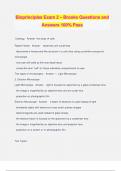
-
Bioprinciples Exam 2 – Brooks Questions and Answers 100% Pass
- Exam (elaborations) • 42 pages • 2024
-
- $13.49
- + learn more
Bioprinciples Exam 2 – Brooks Questions and Answers 100% Pass Cytology - Answer- the study of cells Robert Hooke - Answer- - observed cork could float - discovered a honeycomb-like structure in a cork slice using a primitive compound microscope - only saw cell walls as this was dead tissue - coined the term "cell" for these individual compartments he saw Two types of microscopes: - Answer- 1. Light Microscope 2. Electron Microscope Light Microscope - Answer- - light is focused on s...
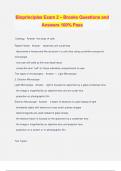
-
Bioprinciples Exam 2 – Brooks Questions and Answers 100% Pass
- Exam (elaborations) • 42 pages • 2024
- Available in package deal
-
- $13.49
- + learn more
Bioprinciples Exam 2 – Brooks Questions and Answers 100% Pass Cytology - Answer- the study of cells Robert Hooke - Answer- - observed cork could float - discovered a honeycomb-like structure in a cork slice using a primitive compound microscope - only saw cell walls as this was dead tissue - coined the term "cell" for these individual compartments he saw Two types of microscopes: - Answer- 1. Light Microscope 2. Electron Microscope Light Microscope - Answer- - light is focused on s...
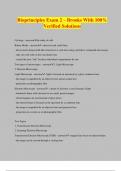
-
Bioprinciples Exam 2 – Brooks With 100% Verified Solutions
- Exam (elaborations) • 31 pages • 2024
- Available in package deal
-
- $13.49
- + learn more
Bioprinciples Exam 2 – Brooks With 100% Verified Solutions Cytology - answerthe study of cells Robert Hooke - answer- observed cork could float - discovered a honeycomb-like structure in a cork slice using a primitive compound microscope - only saw cell walls as this was dead tissue - coined the term "cell" for these individual compartments he saw Two types of microscopes: - answer1. Light Microscope 2. Electron Microscope Light Microscope - answer- light is focused on specimen by a...
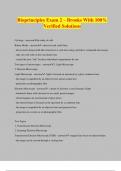
-
Bioprinciples Exam 2 – Brooks With 100% Verified Solutions
- Exam (elaborations) • 31 pages • 2024
- Available in package deal
-
- $13.49
- + learn more
Bioprinciples Exam 2 – Brooks With 100% Verified Solutions Cytology - answerthe study of cells Robert Hooke - answer- observed cork could float - discovered a honeycomb-like structure in a cork slice using a primitive compound microscope - only saw cell walls as this was dead tissue - coined the term "cell" for these individual compartments he saw Two types of microscopes: - answer1. Light Microscope 2. Electron Microscope Light Microscope - answer- light is focused on specimen by a...
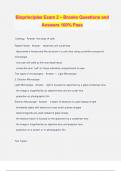
-
Bioprinciples Exam 2 – Brooks Questions and Answers 100% Pass
- Exam (elaborations) • 42 pages • 2024
- Available in package deal
-
- $13.49
- + learn more
Bioprinciples Exam 2 – Brooks Questions and Answers 100% Pass Cytology - Answer- the study of cells Robert Hooke - Answer- - observed cork could float - discovered a honeycomb-like structure in a cork slice using a primitive compound microscope - only saw cell walls as this was dead tissue - coined the term "cell" for these individual compartments he saw Two types of microscopes: - Answer- 1. Light Microscope 2. Electron Microscope Light Microscope - Answer- - light is focused on s...
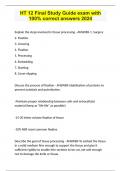
-
HT 12 Final Study Guide exam with 100% correct answers 2024.
- Exam (elaborations) • 24 pages • 2024
-
- $7.99
- + learn more
Explain the steps involved in tissue processing - ANSWER-1. Surgery 2. Fixation 3. Grossing 4. Fixation 5. Processing 6. Embedding 7. Staining 8. Cover-slipping Discuss the process of fixation - ANSWER-Stabilization of proteins to prevent autolysis and putrefaction. -Maintain proper relationship between cells and extracellular material (keep as "life-life" as possible) -15-20 times volume fixative of tissue -10% NBF most common fixative Describe the goal of tissue proces...
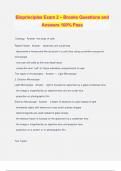
-
Bioprinciples Exam 2 – Brooks Questions and Answers 100% Pass
- Exam (elaborations) • 42 pages • 2024
- Available in package deal
-
- $13.49
- + learn more
Bioprinciples Exam 2 – Brooks Questions and Answers 100% Pass Cytology - Answer- the study of cells Robert Hooke - Answer- - observed cork could float - discovered a honeycomb-like structure in a cork slice using a primitive compound microscope - only saw cell walls as this was dead tissue - coined the term "cell" for these individual compartments he saw Two types of microscopes: - Answer- 1. Light Microscope 2. Electron Microscope Light Microscope - Answer- - light is focused on s...
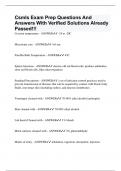
-
Csmls Exam Prep Questions And Answers With Verified Solutions Already Passed!!!
- Exam (elaborations) • 22 pages • 2024
- Available in package deal
-
- $11.99
- + learn more
Csmls Exam Prep Questions And Answers With Verified Solutions Already Passed!!!
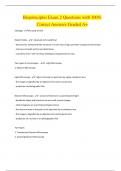
-
Bioprinciples Exam 2 Questions with 100% Correct Answers Graded A+
- Exam (elaborations) • 38 pages • 2024
-
- $12.98
- + learn more
Cytology - the study of cells Robert Hooke - - observed cork could float - discovered a honeycomb-like structure in a cork slice using a primitive compound microscope - only saw cell walls as this was dead tissue - coined the term "cell" for these individual compartments he saw Two types of microscopes: - 1. Light Microscope 2. Electron Microscope Light Microscope - - light is focused on specimen by a glass condenser lens - the image is magnified by an objective lens and an ocular lens...

How did he do that? By selling his study resources on Stuvia. Try it yourself! Discover all about earning on Stuvia


